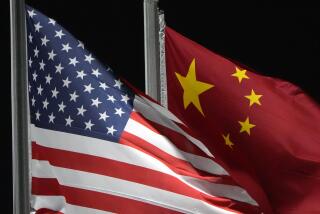Controls tightened on exports to China
WASHINGTON — Despite protests from major U.S. corporations, the Bush administration on Friday tightened regulations governing the export to China of aircraft engines, high-performance computers and other technologies that have possible military uses.
The Commerce Department added 31 products to a list that requires special export licenses in hopes of keeping them out of the hands of China’s military. The licenses, which companies complain are complicated to obtain, are meant to ensure that technology sold to civilian firms doesn’t end up being used to improve Chinese missiles and other weapons.
Administration officials say they are trying to balance economic needs with growing concerns about the communist nation’s rapid military modernization and access to advanced Western technology. But U.S. businesses say the new rules, proposed last summer and sharply criticized ever since, won’t be effective because many of the so-called dual-use products are easily available from other countries.
All the regulations will do, companies fear, is drive away Chinese business when the U.S. trade deficit with the world’s most populous nation is soaring. It reached a record high of $233 billion last year.
The rules change “puts American companies at a disadvantage,” said William A. Reinsch, president of the National Foreign Trade Council, which represents companies doing business abroad. “The long-term impact will be people dropping out of the Chinese market and less trade.”
Because of the rapid growth of its economy and military, China is one of the largest foreign markets for exports that require licenses. In 2006, nearly 10% of all U.S. export licenses were for sales to China, worth about $2.4 billion. U.S. companies exported $55 billion in licensed and unlicensed goods, which include products as varied as iPods and soybeans, to China last year.
Federal officials listened to some of the criticism and trimmed the number of new products on the list by about a third. For example, Commerce Department officials said they had originally planned to require licenses for some general-purpose telecommunications equipment but decided to require them only for gear that operated in extreme temperatures and could be used in space.
The U.S. government categorizes countries by their potential security threat, then limits the export of products that can be used for purposes such as waging terrorism, building missiles and developing nuclear weapons. Dozens of products are restricted for sale to China. In many cases, those items also have harmless civilian uses -- high-powered computers, for example, are used in advanced weather forecasting -- and U.S. officials allow the exports if firms can prove that the technology won’t end up in the wrong hands.
In July the Commerce Department’s Bureau of Industry and Security proposed requiring licenses for the sale of 47 additional products to China. Among them were types of computers, aircraft, semiconductor equipment, navigation systems and telecommunications components.
To offset the effect, the bureau proposed a program that would exempt sales to Chinese firms that undergo special clearance reviews to certify that they do not deal with the military.
“We seek to actively encourage legitimate civilian trade between the United States and China, even as we prudently hedge against the rapid growth in China’s military capabilities,” Christopher A. Padilla, assistant Commerce secretary for export administration, said in a speech in China in January.
Businesses balked, complaining that other countries were not joining the United States in the new export controls and that the “validated end user” program wouldn’t work because Chinese officials were unlikely to allow the required on-site inspections of companies by U.S. officials.
A spokesman for China’s Commerce Ministry strongly criticized the proposal after it was announced, urging the U.S. to drop its “Cold War mind-set.”
Industry groups and affected companies such as Boeing Co., Sun Microsystems Inc. and Applied Materials Inc. urged the Commerce Department to scrap the plan or make major changes.
“Most of the stuff we build is competitively available from world market sources,” said Gerald T. Young, vice president of e-business systems for Bourns Inc., a Riverside company that makes electronic switches and sensors.
“Whether a customer in China would buy it from us or a Korean source or some other source, they’re going to get the product.”
Companies submitted evidence about products on the new list that were easily available from other countries or even in China.
William Morin, director of government affairs for Santa Clara, Calif.-based Applied Materials, praised Commerce Department officials for removing semiconductor manufacturing equipment -- its primary product line -- from the proposed additions. But he said the controls on other products would work only if other countries also restricted them.
Commerce Department officials said they had pressured allies, but none agreed to go along.
“They’re essentially unilateral controls,” Morin said. “By their nature, they’re ineffective.”
More to Read
Inside the business of entertainment
The Wide Shot brings you news, analysis and insights on everything from streaming wars to production — and what it all means for the future.
You may occasionally receive promotional content from the Los Angeles Times.











